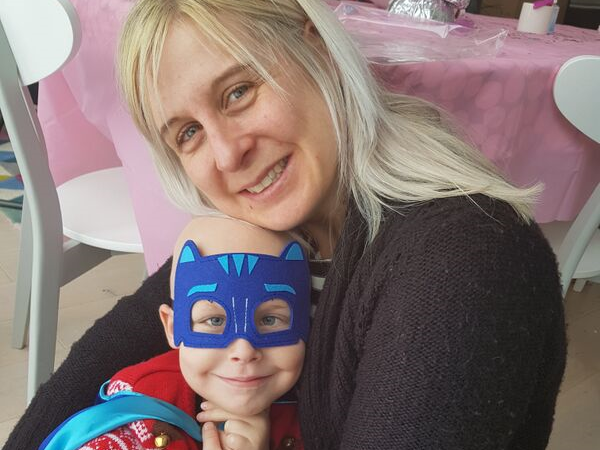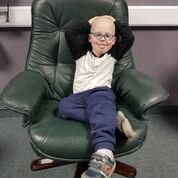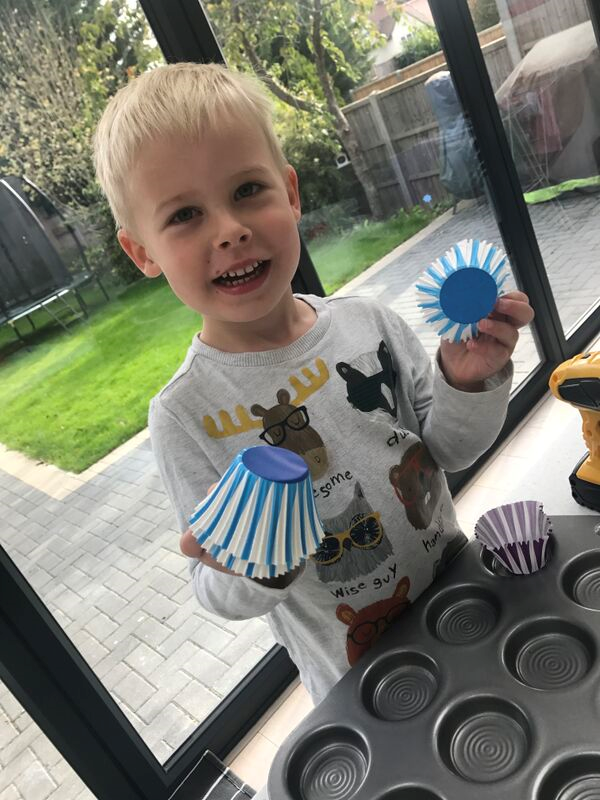'We had a weekend to decide': Parents describe how funding child brain tumour testing opens door to less toxic treatment
Exclusive: Anthea Hobbs’ son, Alex, was diagnosed with medulloblastoma in September 2017. She says every parent should have access to tests that can help tailor treatment and minimise kidney and hearing damage

A mother whose four-year-old son has just completed 10 months of targeted chemotherapy for an aggressive brain tumour has called for every child to have access to testing that can help minimise the risk of life-long kidney damage and hearing loss.
Alex Hobbs had his last session of chemotherapy a week ago but he would have had another three gruelling months ahead if genomic testing of his cancer’s unique DNA markers had not flagged him as eligible for a clinical trial.
The Europe-wide study is trying to establish whether a bespoke chemotherapy regime for medulloblastoma, the most common cancerous brain tumour in children, can cause fewer side effects without impacting survival, and Alex was its first UK participant.
For Alex’s parents Anthea and David, this began with an “impossible choice” between the uncertainties of the trial and wanting to give Alex the best chance of a healthy life.
Anthea told The Independent that it would have been unimaginably worse to have options taken off the table because of a lack of funding or by living in the wrong part of the country.
Today The Brain Tumour Charity has announced it will fund testing for every British child with medulloblastoma for at least two years, meaning many more may find out they’re eligible for the trial. But it is also pushing for the NHS to guarantee funding for all patients.
He was going downhill pretty quickly
The first time Anthea and David noticed anything was wrong was a Friday in September 2017 when Alex began to lose his balance.
“We noticed he was stumbling like he was a little bit drunk, and his eye was turning in like a squint,” says Anthea. “We’d say, ‘Come on Alex, what are you doing with your eyes? You’re being silly’, and he’d correct it.
“We thought there’s definitely something not right here, but I thought he had an inner ear infection.”
As it didn’t seem urgent Anthea booked to see the GP first thing on Monday morning. “The GP pretty much saved his life at that point,” Anthea says. “It was a big tumour and he was going downhill pretty quickly.”
Alex was sent straight to the local hospital in Watford and diagnosed in two hours. They were “blue lighted” to Great Ormond Street Hospital (GOSH) in London on Tuesday morning and on Friday Alex had eight and a half hours of surgery to remove his tumour.
Anthea describes that week as “incredible, but just horrendous”. Even though the tumour was removed in its entirety there was a lot of treatment ahead.
However the road could have been much longer if the hospital had not just become part of the SIOP PNET 5 trial, which has been running in Europe since 2014 and is recruiting 360 participants.
A great step forward
“This trial is providing the ability to give children treatment that is tailored to their tumour and signals a great step forward in brain cancer management,” says Dr Antony Michalski, paediatric oncologist at GOSH and chief investigator in the UK for the SIOP PNET 5 trial.
“Working with our European colleagues, we are able to reduce treatment for children with lower-risk tumours as well as researching ways of improving outcomes for children with standard-risk disease.”
Genomic medicine is the practice of analysing the suite of human DNA markers and mutations and their effects on health and disease. In cancer, as cells multiply the tumours collect a host of mutations that can make them harder to treat or more likely to spread.

Over the last two decades doctors treating medulloblastoma have built up a panel of these “biomarkers”, which Alex’s tumour was checked against. These key genes can give clues on whether the tumour is likely to have left cells in the body that could cause a relapse, and how they might respond to treatment.
Patients at low or standard risk are eligible for the trial and 10 years from now it will assess differences in kidney function, hearing loss and nerve damage between the two groups of patients given either the usual treatment, or treatment tailored to their biomarkers.
However, the primary measure of whether this tailored treatment is effective is survival.
All the evidence suggests the only difference should be that patients given tailored treatment have fewer long-term side effects. But this can only be proven for certain with the clinical trial and this requires patients like Alex, and parents like Anthea and David to accept some degree of uncertainty.
“We had the weekend to decide. The consultant came to talk to us on Friday and said Alex has been deemed as standard risk,” Anthea says.
“He said: ‘We have this clinical trial, here is some information, we need you to tell us by Monday because he needs to start treatment.’”
The options were explained and the likely side effects of the 48-week standard chemotherapy were set out against 36-week tailored chemotherapy he would receive if he was selected for that part of the trial. But the final decision had to come from Anthea and David.
“It’s cold, but it has to be,” Anthea says. ”You’re kind of damned if you do, damned if you don’t. You want him to have the maximum he can have, because with this cancer if it comes back it’s very hard to treat.
“But with chemo, the longer you go on the more your body can’t tolerate it. So they’ve tried to switch out some of the chemo that has an effect on your kidneys and your hearing, and swap in ones they still know are effective.
“There isn’t an effect on the survival rate, apparently. But it’s so hard to know when it’s the beginning of a trial.”
As chemotherapy can be brutal and could have a lasting effect on Alex’s life, they decided to participate.
“Any research that can help us get closer to a cure, while reducing the long-term effects, has got to be worth it for Alex and for future generations,” Anthea said.
As the chemotherapy progressed the medical team had to make changes to the regime: a drug called vincristine had to be omitted in a few cycles because it was damaging the nerves in his hands and feet.
Alex also has some kidney damage, and if he had been on the longer standard course of treatment there would have been more treatment choices to make.
When The Independent spoke to Anthea on Thursday, one week after his final chemotherapy session, Alex was playing on the trampoline. He had already been out on his scooter to help pick up his sister from school and his mum remarked on the way he has taken the last year in his stride.

“I do think the NHS should be funding these tests, and not a charity as they’re only going to be able to do it for a certain amount of time.
“Adults have a choice [in the treatment they want], this is kids and we have to make that choice for them. That’s impossible in itself, but to then to be faced with not being in the right area, not having funding – I couldn’t even imagine that.”
Currently the The Brain Tumour Charity is funding testing for medulloblastoma biomarkers at a cost of £2,200 per child and will do so for at least two years. Alongside York-based OSCAR’s Paediatric Brain Tumour Charity, the charity is also supporting UK children to join the PNET 5 trial as well.
Marie Hughes, who co-founded OSCAR’s six months after losing her son, said: “We saw first-hand how the treatments used to fight brain tumours had a devastating effects on Oscar’s body and mind.
Neil Dickson, who is vice-chairman of the Brain Tumour Charity’s board of trustees, added: “The Brain Tumour Charity aims to halve the harm caused by brain tumours, as well as doubling survival.
“We believe this trial will help us to achieve that goal by protecting some children from a level of harmful treatment which they do not need to survive their tumour.
A spokesperson for NHS England said: “Genomic medicine is already helping to improve the lives of many patients, including children with cancer.
“Later this financial year we aim to introduce the use of whole genome sequencing into routine NHS clinical care, as part of the new Genomic Medicine Service, where there is evidence that there will be real benefits for everyone with cancer and rare diseases.”
Join our commenting forum
Join thought-provoking conversations, follow other Independent readers and see their replies
Comments
Bookmark popover
Removed from bookmarks